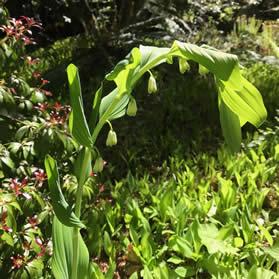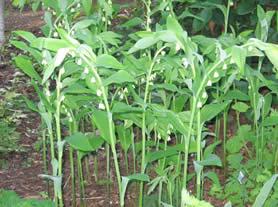Latin name: Polygonatum spp
by Vancouver Island Master Gardeners Association
This lovely spreading colony of arching single stems provides a graceful foliage plant for the woodland garden. The bright green leaves contrast with the cream-coloured twin bell-like flowers bringing an exotic articulation to the spring garden.
Polygonatum is a genus of some 60 herbaceous species called Solomon’s seal. In addition to the eastern North American species (biflorum), there are several attractive European and Asian species and cultivars available. Their attractive zig-zag foliage brightens shady woodland gardens before turning yellow and dying down in the fall. The flowers are in pairs or clusters of greenish white bells which later in the summer produce small blue/black berries.
This genus generally prefers moist semi-shady places in the garden but when established most species become quite drought tolerant. They are also reportedly deer resistant.
At Milner Gardens, the Solomon's seal (Polygonatum X hybridum) may be seen by the Gardener's Cottage, and opposite the big Douglas fir near the Nursery, with more gracing the Katsura tree path.


Photos courtesy of: Phyllis Fafard and Milner Gardens & Woodland.
|
Attribute |
Description |
|---|---|
|
Form: |
Herbaceous perennial from thick rhizomes producing unbranched stems which die down in the fall. |
|
Foliage type: |
Alternate, simple, entire, lance-shaped or oval leaves to ten cm in two rows on the stem. |
|
Height/Width: |
P. biflorum can reach 1 metre and spreads slowly to form colonies. |
|
Hardiness Zone: |
USDA 3 – 9. |
|
Exposure: |
Partial to full shade. |
|
Flower colour: |
Flowers are greenish white in pairs hanging below stem. |
|
Leaf colour: |
Bright green – some species have coloured leaf edges and stems and there are variegated varieties as well. |
|
Flower time: |
Spring or early summer. |
|
Preferred soil and Watering: |
Ordinary garden soil and regular water (once a week until established.) Can be grown as a pot plant. |
|
Other: |
The name Polygonatum comes from the Greek meaning “many knees” and refers to the jointed rhizomes of the root stocks. Solomon’s seal was so named supposedly because the healed-over leaf scars on the rhizomes resemble the design of King Solomon’s wax seal. |

